She made world headlines when she was mauled by two male lions, but just three years on Jen Brown opens up about the incredible journey that has her back working with big cats where she belongs.
Zookeeper Jen Brown won’t hear a bad word said about the two male lions who mauled her and left her fighting for life.
To this brave animal lover, the attack three years ago was just something that happened – and there is no way she is going to let it define her or prevent her from working with big cats again.
She said she has nothing but respect and admiration for the majestic creatures, even the two young males who viciously attacked her, leaving her physically and emotionally scarred.
In her first interview since the accident at Shoalhaven Zoo on May 29, 2020, Jen revealed that one of the first things she did when she left hospital after months of surgery and sometimes harrowing recovery, was visit her two “favourite, handsome boys” – the 18-month-old lions Ariel and Juda.
Watch: Jen Brown as she returns to looking after lions in her role as a zookeeper. Press play on the video below
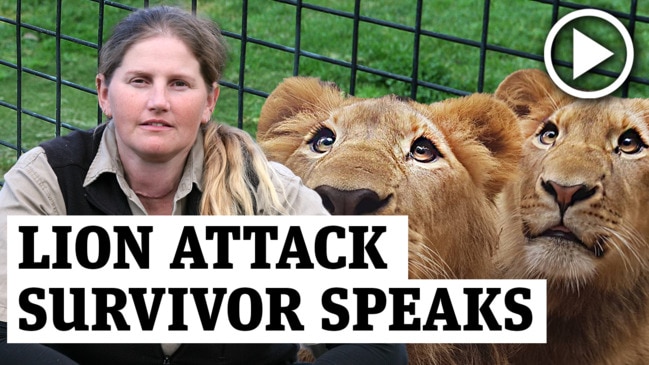
It was an important step in her recovery.
“It was so great to see them,” she said. “I had to see them. I couldn’t let the incident be the last time I saw them.
“It was awesome. Ariel was my special boy.”
There was never any question of whether or not the 38-year-old animal lover would work with lions again.
The only question was when. “Lions are cool, they’re amazing, they are my oxygen,” Jen said, during an interview at her new workplace, a zoo on the Central Coast where she is back working with lions.
“It was an accident, that’s it.
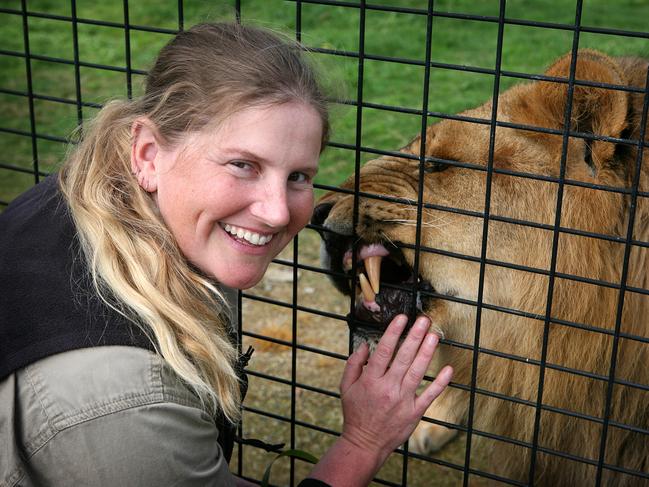
“It doesn’t define me. It really was just a bump and then you carry on, what else are you going to do, you just keep going.
“It doesn’t define me and it doesn’t define how I’m going to live the rest of my life.”
She said the hype around her near-fatal encounter has been harder to handle than her phenomenal and exhausting road to recovery.
“I’m famously boring,” she insists, her gaze revealing an air of exasperation as she reluctantly agrees to speak publicly.
Jen is irritated by people trying to piece together the circumstances leading up to her accident or make assumptions about what happened as she routinely cleaned the big cat enclosure.
She was doing what she’s done so many times before when the two adolescent males attacked her, leaving her semiconscious with life-threatening head and neck injuries.
She doesn’t remember exactly what happened and now she doesn’t like listing her injuries and won’t stand for her encounter being described as an “attack”.
She visibly recoils at any offer of sympathy.
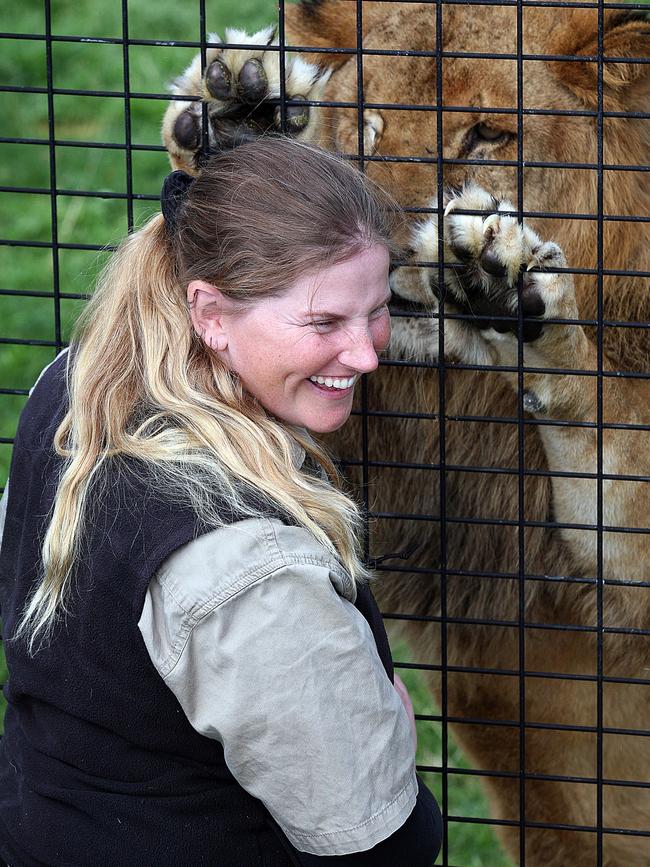
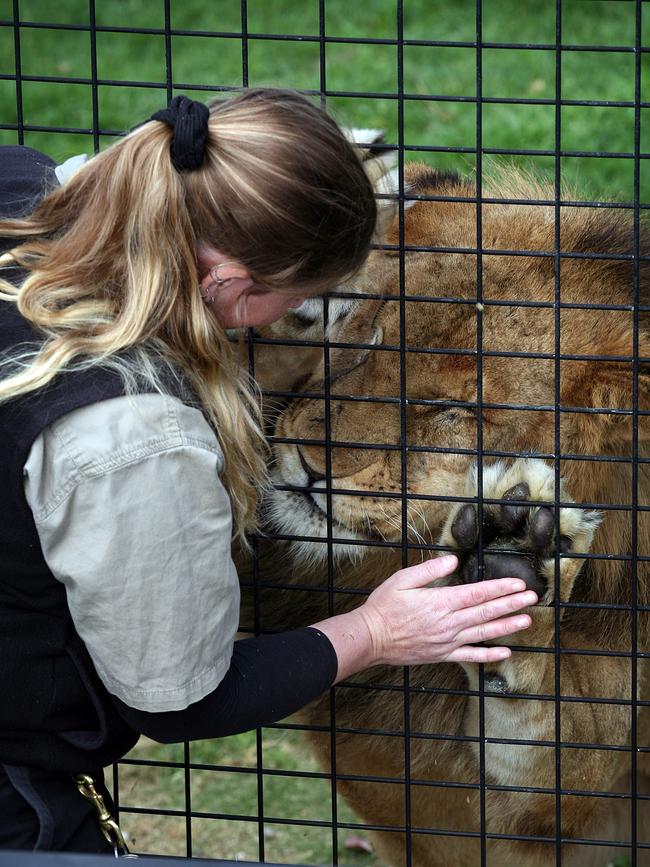
Jen is fiercely private about the accident, the aftermath and the extensive rehabilitation both physically and mentally, as she stoically and methodically goes about rebuilding her life.
She wants to be left to go about her business of caring for the lions and other animals at her new home, Central Coast Zoo, which is not yet open to the public. As a trainer and assessor she is looking forward to getting more involved in teaching the next generation of zookeepers.
Jen now helps look after the pride of six African lions following their retirement from the Stardust Circus due to the Covid pandemic.
She also looks after the meerkats, camels and growing family of animals at the Wyong Creek-based zoo and helps train the young staff, “showing them the ropes”.
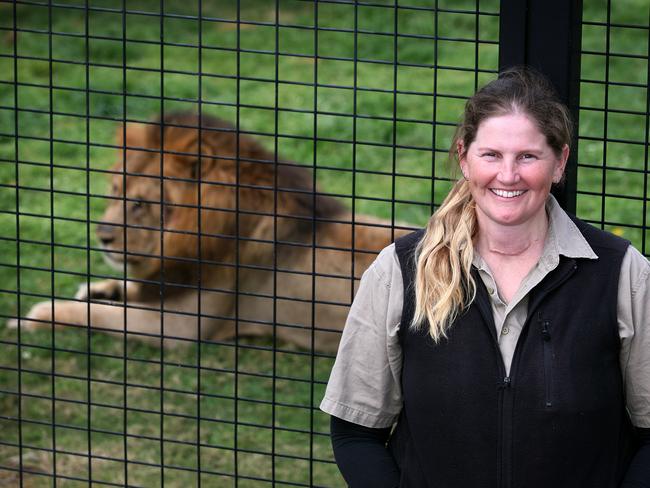
Jen scoffs at the suggestion a new-found fear of lions would be understandable, expected, even natural.
“There’s nothing to be scared of,” she says.
“I have a healthy respect for them. There is no animal that I’m scared of, you just have to learn what they do and why they do it.
“I know people who risk their lives every day to look after animals, that’s just part of the job. Being bitten by snakes is a common occurrence, plenty of people are bitten by small crocodiles, all kinds of animals.
“Even things you don’t think will bite you – even horses and donkeys can be dangerous … birds, you name it. It’s just part of the job, but it’s fun. That’s why we do it, we love animals.”
THE “ACCIDENT”
Friday, May 29, 2020, started out as an ordinary day for the then 35-year-old experienced lion keeper. The zoo was closed for Covid at the time and about 10am Jen was cleaning the lion enclosure, just like she had done so many times before.
Half an hour later, a frantic emergency radio operator put out a call for urgent response to a report of a lion trainer attacked by two lions inside an enclosure in the zoo at Nowra, south of Sydney.
Police and ambulance crews rushed to the scene and were confronted with a horror scene that one experienced paramedic will never forget.
“This is one of the worst jobs I have ever experienced — I have never come across a job like this in my career,” NSW Ambulance duty operations manager Inspector Faye Stockman told journalists at the time.
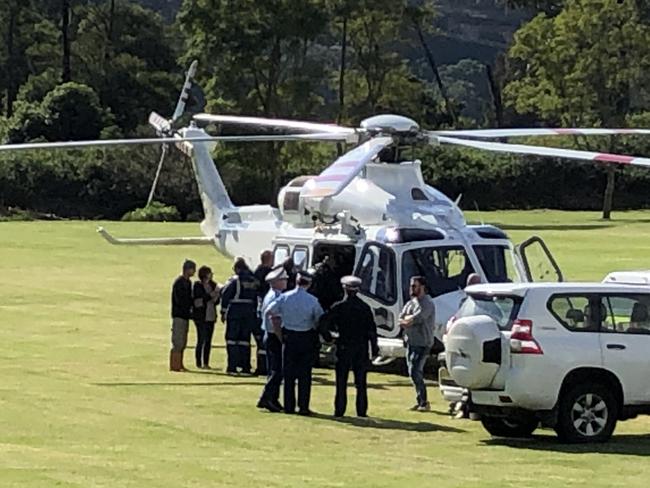
“It was absolutely harrowing. It is an incredibly dangerous situation, both for the patient and the paramedics.
“Being the first to walk into the enclosure was one of the most frightening experiences — we literally had to walk into a lion’s den.”
Jen, who was semiconscious, suffered deep lacerations to her face, head and neck.
She was flown to St George Hospital in a critical condition. Police officers set up a crime scene and commenced investigations.
For the next few weeks media crews camped outside the hospital in southern Sydney, desperate for any word from a hospital spokeswoman or a family member.
The longer the wait went on, the more the excitement grew that this tragedy may turn into a miracle story of survival.
Hundreds of wellwishers from across the globe posted messages of support on social media, Jen’s family and closest friends though stayed silent.
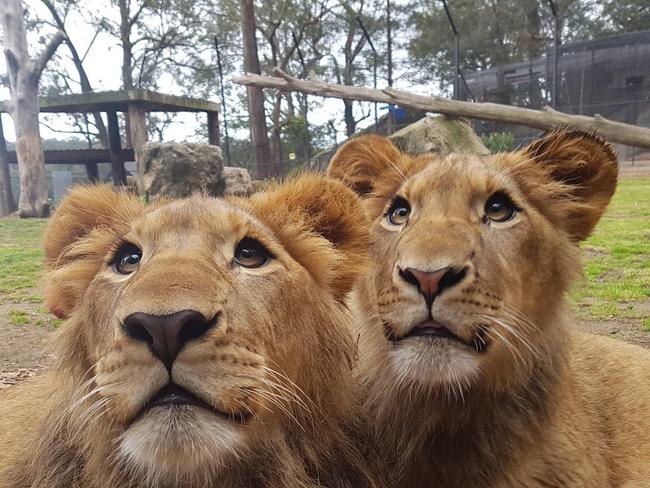
They had one thing on their mind – their girl getting well.
With very limited access to information about Jen’s condition, media attention turned to the fate of the lions and various probes began into the circumstances surrounding the attack. The zoo reviewed its safety and workplace health procedures.
Police sources, who handed over control of their investigation to SafeWork NSW, said investigators would look at cleaning protocols and procedures when dealing with dangerous animals, including whether two staff members should have been present.
Zoo industry sources have told The Saturday Telegraph that safety procedures and protocols are the responsibility of individual parks and need approval from the Department of Primary Industries. Therefore procedures differ at each wildlife park, depending on the group dynamic, the number of lions within a group, their ages, sexes and the size of the enclosure.
Lion keepers make the call on when lions reach a level of maturity, age, size and weight that requires humans to change the way they interact with them.
More than a year after Jen’s accident, NSW parliament was told that SafeWork NSW had completed its investigation and no prosecution proceedings would be brought in relation to this incident.
This week a spokesman for SafeWork NSW confirmed the investigation “did not reveal a breach of applicable work health and safety legislation”.
“SafeWork NSW has completed an investigation into an incident at Shoalhaven Zoo where an employee suffered serious injuries after being attacked by lions on 29 May 2020,” a spokesman said.
“SafeWork NSW carefully reviewed all the information and evidence available in relation to this incident and determined it was not appropriate to commence legal proceedings.”
The news was not surprising to Jen, who three years on, bristles at the mention of her encounter being anything other than an accident.
When asked again this week why she doesn’t talk about the accident she matter-of-factly said: “Because I don’t want to”.
“No, that’s not right, take out the word ‘want’. I don’t talk about it. It doesn’t define me, it happened but so much other stuff has happened as well and it’s just such a small thing.”
Her steely expression is her way of protecting herself, and her memory of the traumatic incident is shaky.
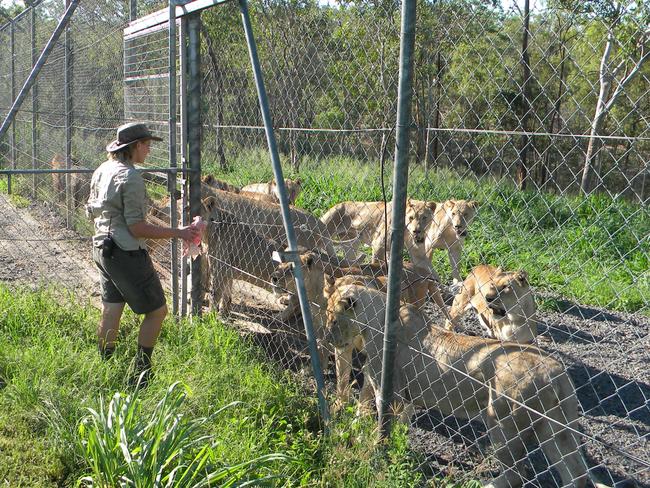
“I don’t remember it,” she said, and shrugs at suggestions the lack of recollection was her mind’s way of shielding her from the trauma.
The road to recovery was long and tough. Surgeries, rehabilitation and, in the months after the incident, counselling.
Jen only let those closest to her visit her during those touch-and-go weeks in hospital.
Once she was home recovering she started to see people closest to her. One of her best friends knew just how to touch her heart.
Instead of flowers she came bearing a stuffed toy lion.
“She knows me well, all my friends know how much I love lions,” Jen recalled. “I still keep it on top of my fridge today. It was the perfect present.”
JEN AND THE LIONS
What’s abundantly clear now is that Jen harbours no animosity towards the lions, her colleagues or the South Coast zoo where she loved working.
In fact, Jen has been back to visit Ariel and Juda several times and keeps a close eye on them. She also watches their progress through social media. The duo were just juveniles at the time of the incident, weighing about 100kg. Now they are mature adult lions.
Her first visit with them was something she had to do.
“They are such pretty, beautiful lions. It was so good to see them again. I noticed how much they had grown in a short time,” she said.
“I guess we totally just stared at each other in the eyes and contemplated our existence. Except then I realised they were lions and they probably were just contemplating how long it was until dinner,” she joked.
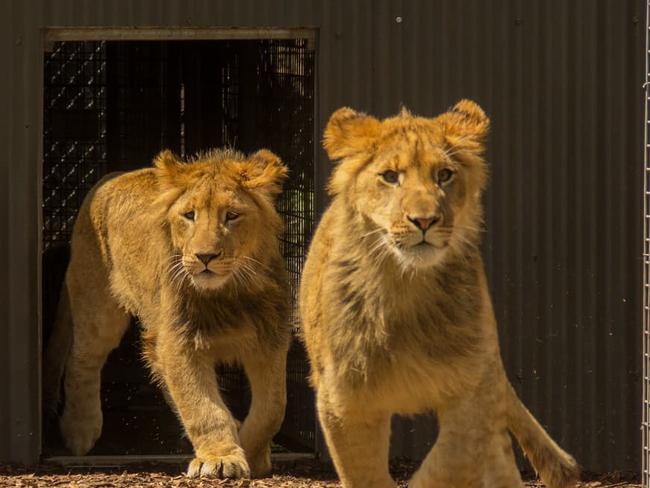
The zoo continues to consistently post about Ariel and Juda and a pride of white lions that also call the facility home.
In the months after the incident, Shoalhaven Zoo’s social channels was posting updates on Jen’s recovery with photos of the two lions. On June 4, the zoo posted: “We are very pleased to let you know that Jen is making good progress in her recovery. Your well wish messages have been much appreciated”.
In an update on the zoo’s Facebook page after the incident, Shoalhaven zoo owner Nicholas Schilko answered the question most often asked at the time – will they be euthanised?
The answer was no.
Mr Schilko said the care and welfare of all the zoo’s animals remained a top priority.
He added Ms Brown was making good progress in her recovery.
“We’re staying in constant touch with our keeper Jen Brown and her family, and are enormously relieved to report that she is recovering from lacerations that she received when visiting the lions’ den,” Mr Schilko said.
Jen’s priority after her recovery was always to get back into caring for animals. She was always hopeful of working with lions again, but there are limited opportunities to do so in Australia.
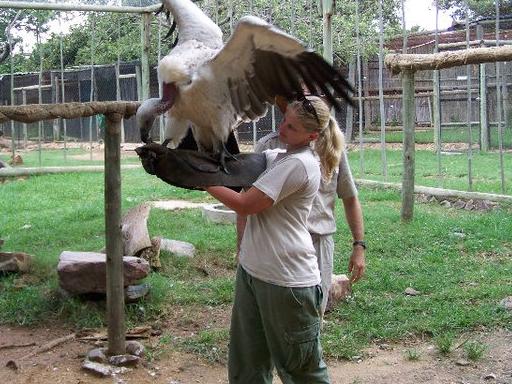
Today she works with the pride of former circus lions.
“The lions have adapted really well to a stationary life. They were in the circus so obviously they travelled around,” she said.
“A lot of people think negatively of the circus but that’s a very old-style view. It’s very well regulated and they were looked after very well.
“It’s unfortunate they had to be retired early but it was really lucky there was a zoo that was able to build an enclosure for them so that they can all stay together.”
While the zoo is not yet open to the public, the adjoining Amazement Farm and Fun Park has koalas, kangaroos, reptiles and other domestic animals on exhibit and visitors who take the train ride can see the larger animals, including the lions.
Jen is responsible for training and mentoring all staff at the animal park and ensuring standards of welfare are maintained.
Her role is to also co-ordinate the health care with the visiting vet and to create preventive health programs. When we visited she was co-ordinating care for one of the lionesses.
ANIMAL LOVER
Jen calls herself the “black sheep of the family”.
“I have two brothers that are in IT, my dad’s an engineer and my mum is a teacher,” she said, adding none were particularly fond of animals.
“The first pet I had was a budgie when I was about 13 but now I can have whatever I want because I’m the one who has to clean up after them,” she joked, revealing her home sanctuary includes dogs, cats, lizards and a “big” snake. There is not one animal that scares her. She’s worked with everything from hyenas, tigers, rhinos, hippos to native kangaroos and koalas.
“None scare me because there is nothing to be scared of, they are just doing their thing, you just have to learn what their thing is and work with it.”
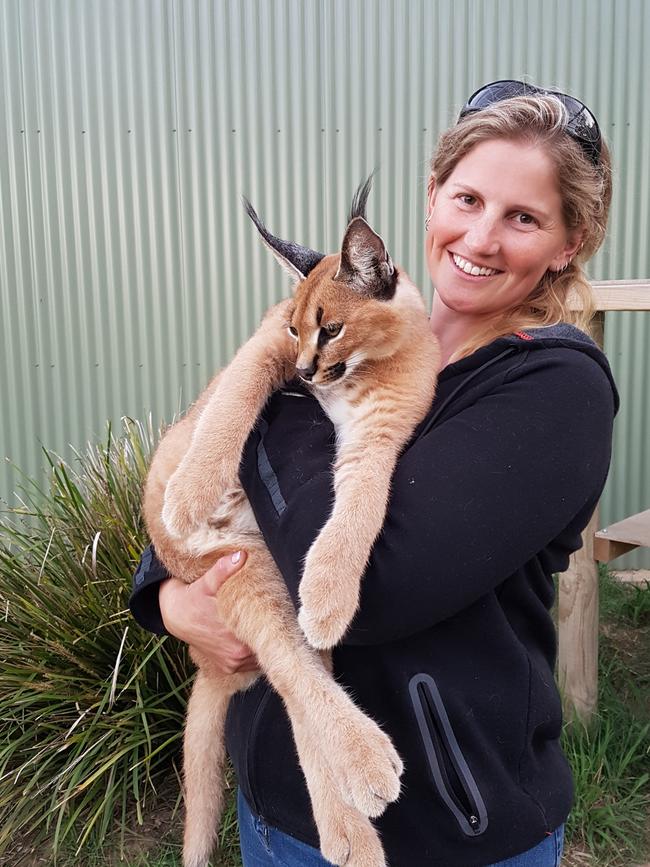
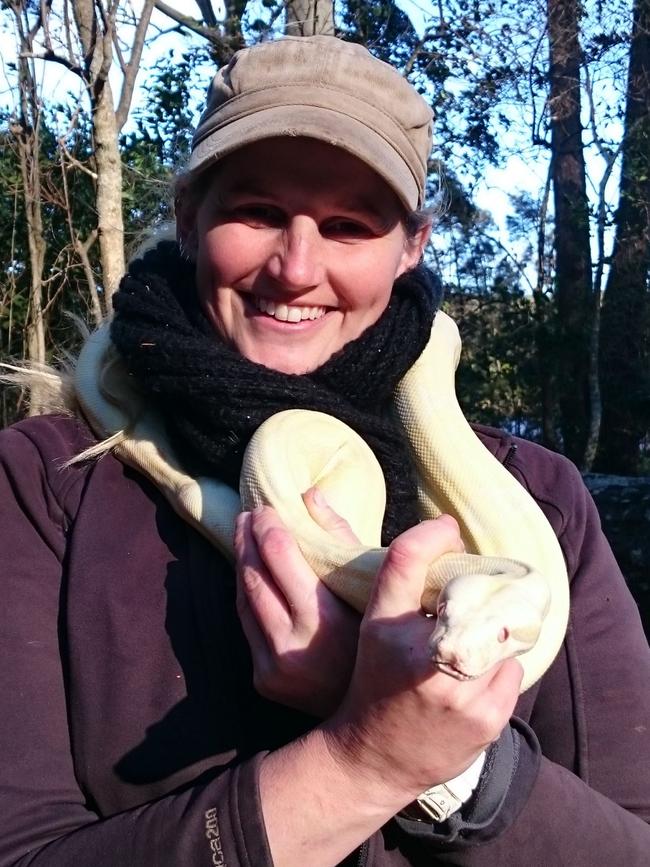
Before Shoalhaven Zoo Jen was a keeper at Symbio Wildlife Park south of Sydney, working with everything from tigers to red pandas and spider monkeys.
She then moved to Cairns and has done stints overseas, including at a wildlife park in the United Arab Emirates and volunteer work in South Africa.
As a girl Jen was first drawn to big cats when she saw the tigers at Dreamworld. “I thought I wanted to do that job,” she said.
“The first time I patted a lion I thought it was exciting. Not scary, it was awesome.”
When Jen first started working with saltwater crocodiles she wasn’t such a fan of the “big ones”.
“I found them a little intimidating. Give me a lion or a tiger any day. A lion and a tiger I knew what they could do but with the crocodile I just had a mental block. They wanted me to learn to feed it for a show and I thought: ‘I just can’t. Finally I had to get a co-worker to get in the exhibit with me. He was a lovely crocodile and very well trained and he knew what he was doing but I didn’t,” she said.
“I would hold the food and ask him to come out of the water. He was a good boy when he came out. He would walk towards me so I would walk back. Then the faster he would come towards me the faster I would walk back. I didn’t get it. I thought: ‘The crocodile doesn’t like me, I need help’.
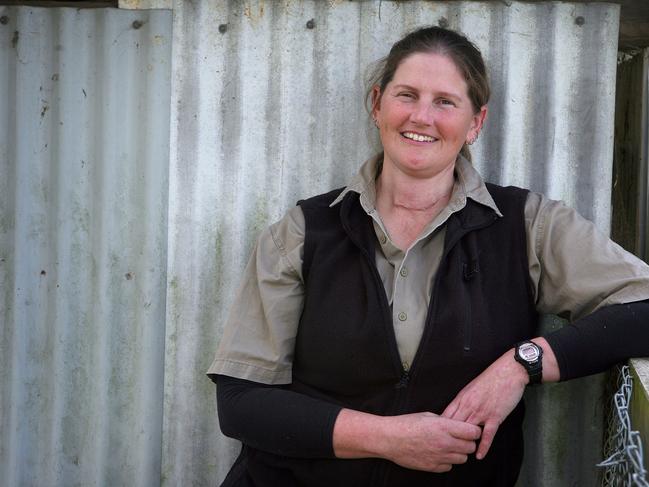
“The co-worker stood in the exhibit with me, the croc came out of the water, and I didn’t realise but I took half a step back. My co-worker noticed and held the back of my shirt so I stood still and couldn’t move backwards. As soon as I stopped walking the crocodile did too.
“He was being a good boy doing what he was meant to do. It was me who didn’t know what I was doing. As soon as I stood still he knew what to do. I went on to feed him for years.”
Rhinos are another favourite. “They love a belly scratch and are fun to play with,” she said. “I had no interest in them when I started working with them, I thought they were boring. I had no interest until I realised they had so much personality.”
Letting everyday people in on a little secret, Jen said meerkats are very food motivated; they don’t really care about people’s interactions, despite the fact zoo visitors usually find them the most interactive friendly creature on display.
Marmosets aren’t shy either and will cling onto a human neck – but it’s more to sniff the perfume than crave a cuddle.
One of her favourites at Central Coast Zoo is the very friendly magpie who rolls over on his belly for a scratch.
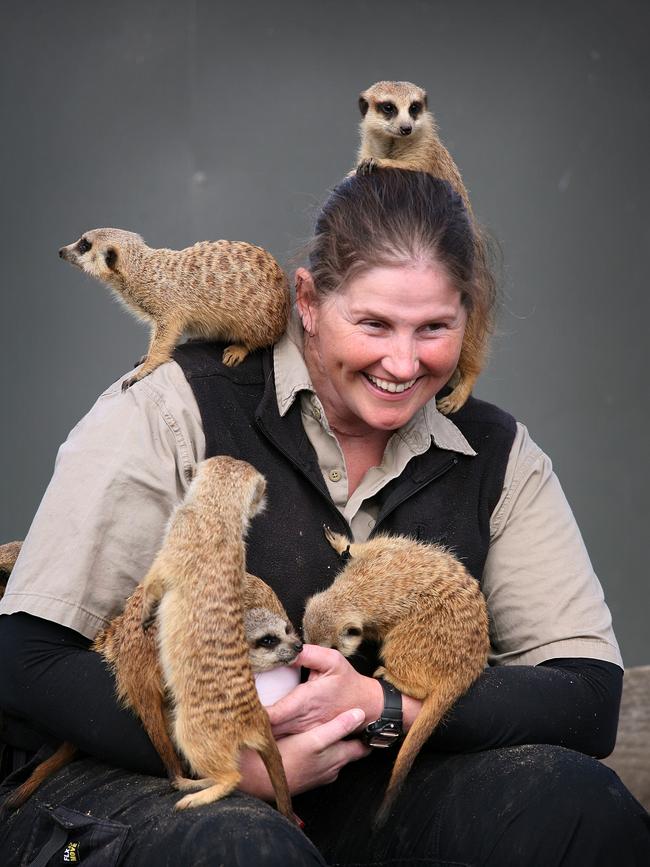
But big cats are the key to her heart and when she talks about them it is clear she is in her happy place — and is like a behavioural encyclopaedia.
Lions are a little bit like a cross between a dog and a cat, whereas a tiger has more of a cat’s personality, she says.
A lion’s roar can mean a lot of different things.
“Sometimes the roar does mean go away, I’m cranky but then usually they will walk away. Sometimes it’s because they want the interaction, they want a reaction from you. If they get the reaction they want they will go again.”
Jen has fond memories of working in Cairns where she would open the gates and watch the 16 lions coming over the hill towards her.
“I love it, they are incredible.”
Tigers remind her more of her pet cat “that just wants to sit next to you but doesn’t necessarily want you to cuddle or make a fuss or interact”.
“They just want to be there, not the attention on them. With big cats some like interaction some don’t, it’s about personality.
“I had a tiger years ago that hated everybody. That’s how he was introduced. I have a soft spot for animals like that and he became my best friend I think because I spent the time hanging out with him and talking to him.
“He would come over for a scratch every day. He was a great tiger.”
JEN’S A KEEPER
Despite her craving for privacy, Jen will likely always be remembered as the woman who survived against the greater beasts when common sense says she shouldn’t have.
But she is so much more than a headline.
She said she plans on making a difference, being a voice for animals that need protecting and teaching people how to better care for them, understand them and respect them. No one-off encounter is going to keep her from the carnivores she adores.
She loves her work at Central Coast Zoo and looks forward to the day the lions, camels, monkeys, reptiles, and other animals can be on display to the public.
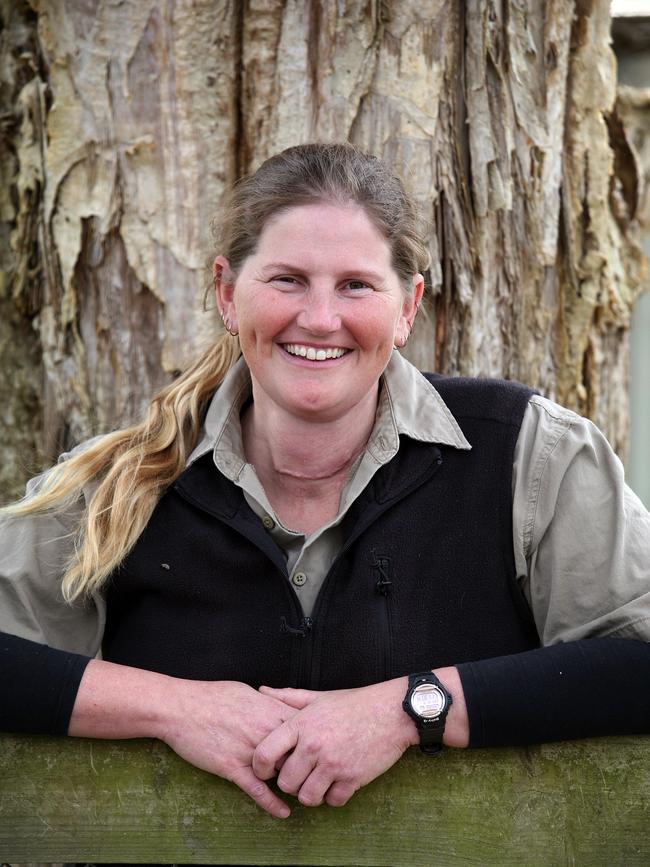
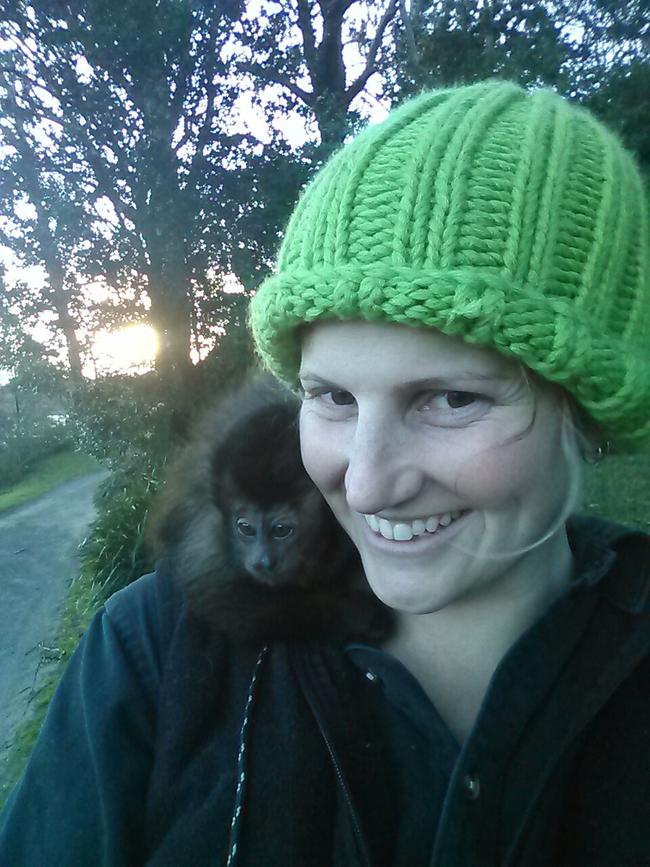
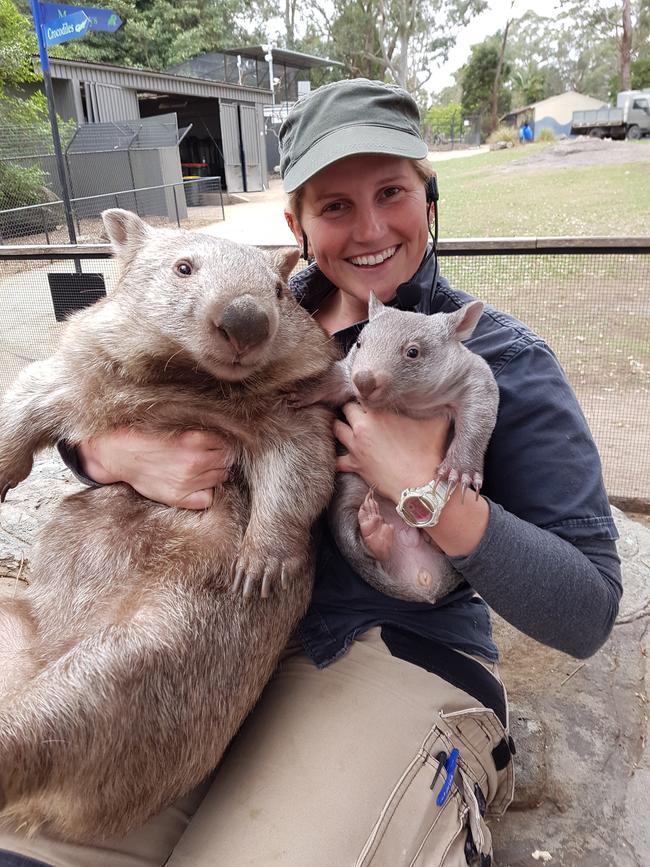
She’s also passionate about teaching and working with young budding zookeepers.
She is working with the Central Coast Zoo owners to create a program where people can study on site and get on-the-job experience – the type of experience that textbooks can’t provide.
“At one place I worked we had a male goat who was great for teaching. Because if you were the slightest bit hesitant he would knock you on your butt, so it was a really good tester for new people,” she said.
“If you can’t handle him there is no way you can handle other stuff. There is no way you can work with other animals if you can’t learn to work with the bossy goat.
“A person who works with cats and dogs is better at reading animals than someone who just really wants to be a zookeeper, so you have to really assess their confidence.”
A capuchin monkey also proved a good team member for sorting through the candidates, she said.
“If you weren’t confident she would have a crack at you and she would remember you.
“Then if you were with someone she wouldn’t do it, but then when you were back on your own she’d go again.”
She has never considered a career change and never will.
“Well, I mean, this is my life. It’s just who I am, and what I do. I can’t not do it. I’ve never not done it. This is me.”
She says people should look out for her next adventures by following her social media – Jen’s a Keeper.
Got a news tip? Email weekendtele@news.com.au

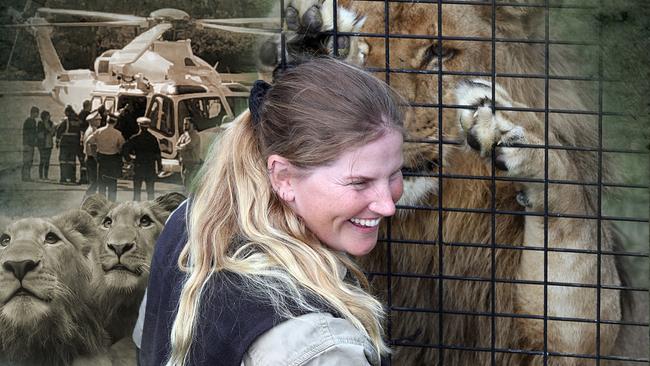
Add your comment to this story
To join the conversation, please log in. Don't have an account? Register
Join the conversation, you are commenting as Logout
Ray quickly and quietly downsizes
Award-winning media veteran Ray Martin, who has quietly sold his Waverton home of 35 years, has bought in nearby Cammeray.
Revealed: Email spruiking Kia Carnival before Haylen’s winery trip
A month before former transport minister Jo Haylen took the fateful trip to a winery in a taxpayer-funded Kia Carnival, bureaucrats in the Premier’s Department were spruiking the vehicle to ministers.